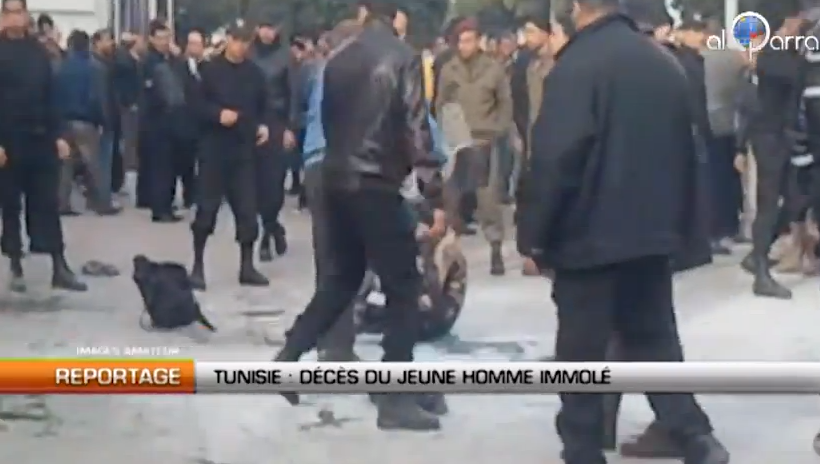On 12 March, Adel Khadri, a twenty-seven year old cigarette street vendor, set himself on fire on Tunis’ main street, Habib Bourguiba Avenue. According to eyewitnesses, Khadri shouted: “This is a young man who sells cigarettes because of unemployment,” before setting himself on fire. Khadri passed away early this morning at Ben Arous’ Burns Hospital.
Collective blog Nawaat reports [fr]:
Le jeune vendeur à la sauvette qui, désespéré par ses conditions de vie, s’était immolé, est décédé mercredi à l’aube, dernière illustration en date des tensions sociales en Tunisie auxquelles le nouveau gouvernement devra faire face une fois investi. “Il est mort aujourd’hui à 5 h 30 du matin des suites de ses graves brûlures“, a dit Imed Touibi, le directeur du Centre des grands brûlés de Ben Arous (banlieue de Tunis) où le jeune homme de 27 ans, Adel Khadri, était hospitalisé.
Anguished by his living conditions, the young street vendor who set himself on fire passed away at dawn on Wednesday. This is the last illustration of the social tensions in Tunisia, which the new government, once in place, should deal with. “He died today at 5.30am from severe burns,” said Imed Touibi director of the Centre of Severe Burns in Ben Arous (a Tunis suburb), where the young twenty-seven year-old man was hospitalized.
Quoting the privately-owned radio Mosaique FM, the author of the blog Massir Destin reports on the number of self-immolations in Tunisia:
Oh mon Dieu!!!
Le nombre d`immolations par le feu en Tunisie:
2 en 2010
91 en 2011
63 en 2012
11 en 2013
Source Mosaïque fm. Mais on n`a pas précisé le nombre de décès.
Oh my God!!! The number of self-immolations in Tunisia:
2 in 2010
91 in 2011
63 in 2012
11 in 2013
Source: Mosaique FM. But they have not reported on the number of deaths.

[Bystanders attempt to save Adel Khadri after he set himself on fire. Image taken from screenshot of video uploaded by Al Qarra TV.]
On 17 December 2010, Mohamed Bouazizi, a fruit street vendor from Sidi Bouzid, set himself on fire when police confiscated his wares. His desperate act ignited social justice and pro-democracy protests in Sidi Bouzid and eventually the entire country, forcing autocratic ruler Zine el Abidin Ben Ali to flee to Saudi Arabia eighteen days later. However, twenty four months after the ouster of Ben Ali, Tunisia is still going through intense socioeconomic difficulties, further intensified by a political crisis deepened by the assassinationof opposition leader Chokri Belaid on 6 February. High prices, a 16.7 percent unemployment rate, and disparities between regions are all making the lives of Tunisians, especially underprivileged groups, harder. Khadri, was not only suffering financial destitution, but, according to his brother, had stomach problems but did not have enough money to get treatment.
Benoît Delmas, a Tunis-based journalist writes [fr]:
Adel Khadri est-il mort pour rien? La question semble indécente mais elle est suscitée par le silence politique qui a entouré l’annonce de cette immolation. Laquelle renvoie inévitablement au point de départ de la révolution tunisienne lorsque Mohamed Bouazizi, un vendeur à la sauvette de fruits et légumes, s’aspergea d’essence et s’immola à Sidi Bouzid, le 17 décembre 2010. Avant et après Bouazizi, d’autres cas similaires furent notés. La mort, au petit matin, d’Adel Khadri devrait interpeller toute la société tunisienne. Un pays qui n’offre aucun espoir à sa jeunesse est un pays qui s’étiole, s’effondre. Il ne s’agit pas d’exiger des remèdes miracles mais de demander à la classe politique, majorité et opposition, de bien vouloir travailler pour le bien commun, l’intérêt national, le peuple. Les chicaneries politiciennes qui polluent toutes les vieilles démocraties ne sont pas d’une urgence absolue pour un pays qui vit librement depuis seulement deux ans et deux mois.
Did Adel Khadri die for nothing? The question seems indecent, but it is provoked by the silence of the political class surrounding the announcement of this self-immolation. This is inevitably a return to square zero for the Tunisian revolution, when Mohamed Bouaziz, a fruit and vegetable street vendor, sprinkled himself with gas and set himself alight on 17 December 2010. Prior to and after Bouazizi`s [self-immolation], similar cases were registered. The death of Adel Khadri at dawn should be a call for the entire Tunisian society. A country which offers no hope for its youth is a fading and collapsing country. It is not a question of asking for miraculous remedies, but rather calling upon the political class, both the majority and opposition, to work for the common good, the national interest, and the people. The political chicaneries that are tainting old democracies are not an urgency for a country that has been living in freedom for only two years and two months.
[This article was originally published on Global Voices.]
![[An ambulance takes Adel Khadri to the hospital following his self-immolation. Image taken from screenshot of video uploaded by Al Qarra TV on YouTube.]](https://kms.jadaliyya.com/Images/357x383xo/ScreenShot2013-03-13at2.49.02PM.png)














